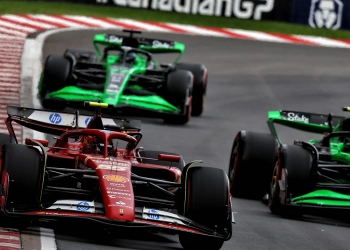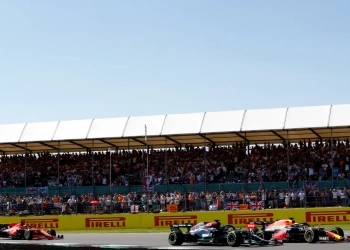Formula 1 has so far visited only one venue as part of a 23-round campaign but it was a closely-fought affair between Mercedes and Red Bull. Can previous season openers, and Formula 1’s most recent trip to Bahrain last November, provide any clues for the rest of 2021?
Only twice before had Bahrain held the honour of opening the new Formula 1 campaign.
Back in 2006 Fernando Alonso narrowly fended off Michael Schumacher to triumph – a portent for a championship season that was initially dominated by Renault before a mid-season rule change brought Ferrari into firm contention.
In 2010 Ferrari debutant Alonso also won, though trailed Sebastian Vettel until an engine issue slowed the Red Bull driver. Vettel had the fastest package flawed by reliability, with a cannier Alonso in the hunt, and that was how much of 2010 played out too.
But what about season-openers in the hybrid era?
There are occasional anomalies and interlopers on account of instances such as inclement weather, yellow flags (or even red flags) interrupting qualifying and the race, plus the fact Melbourne’s Albert Park – a complete opposite in terms of circuit characteristics to Bahrain – was the venue for the curtain-raiser through 2019.
Lewis Hamilton, something of a Melbourne specialist, romped to six successive poles from 2014 through 2019, underlining the pure pace of Mercedes’ package, but only won once in that time frame – in 2015.
In 2014 Hamilton was undone by a cylinder failure that prompted retirement, in 2016 and 2019 slower starts provided the momentum to team-mates Nico Rosberg and Valtteri Bottas, while in 2018 an inopportune VSC timing paved the way for Sebastian Vettel to succeed. Only in 2017 was Mercedes’ defeat truly inflicted by a combination of having inferior speed, though even then its strategy was less than stellar, with Hamilton held up by the slower yet-to-stop Max Verstappen around the hard-to-pass Albert Park.
In 2020, when Austria’s Red Bull Ring hosted the opener, Mercedes was comfortably fastest, with Hamilton’s prospects hampered by yellow flags in qualifying – ironically caused by Bottas – and a clash with Alexander Albon in the race, after Red Bull strategically zigged when Mercedes zagged.
Prior to last weekend Hamilton had taken seven titles but only two season-opening wins – meaning he is hardly a driver who has traditionally got out of the blocks in rapid fashion. Rosberg used his 2016 victory as a springboard for that year’s title but across the following quartet of years the title charges of Vettel and Bottas duly faded. Hamilton’s strong start to 2021, therefore, isn’t a welcome development for Bottas.

But that was Australia and Austria – what about Bahrain?
Mercedes has swept to seven successive titles in the hybrid era but since revised aerodynamic regulations came into play in 2017, which brought Ferrari back as a factor, Sakhir has not been its happiest hunting ground, at least compared to the likes of Sochi Autodrom or Suzuka, where it has never lost in the hybrid era.
In 2017 it was beaten in race trim by a faster Ferrari package and one year later the situation was replicated, with Ferrari 0.166s faster too in qualifying. In 2019 its qualifying deficit to Ferrari was 0.324s and arguably the scarlet SF90s should have picked up a 1-2 in race trim too but for Charles Leclerc’s cylinder failure and Sebastian Vettel’s spin. Had pre-season testing and the opening race taken place in Bahrain in 2019 then performance-wise it would have looked quite rosy for Ferrari – but for much of the campaign it was only a distant threat to Mercedes as different circuits and conditions favoured the superior Silver Arrows.
Last year, for the first time since 2016, it claimed both pole position and the race win in Bahrain, courtesy of Hamilton.
But its recent questionable displays have been in comparison to Ferrari – rather than Red Bull. Once the Milton Keynes-based squad is brought into factor it highlights that it can be buoyed by the current situation.
Verstappen trailed Hamilton by 0.414s during qualifying in last November’s race but turned around the deficit into almost the same advantage – 0.388s to be precise – in Saturday’s Q3 session.
Red Bull’s shortfall to Mercedes in Bahrain’s Q3 since 2017 has previously been 0.753s, 0.274s and 0.562s respectively. Put simply, Bahrain has never been the happiest hunting ground for Mercedes, but it has been a far less appealing venue for Red Bull.

Bahrain has also typically been either the second or third round of a campaign, rather than round 15 as it was in the pandemic-hit 2020 season, and thus Red Bull’s displays have often been underwhelming – in line with its trait of starting a year on the back foot.
Verstappen’s pole and closely-fought runner-up spot was Red Bull’s best display in Bahrain in the hybrid era. It spent much of the latter stages of 2020 emphasising its need to start 2021 strongly and it looks as if it has delivered on its expectation. Pole, and a race result of second and fifth, was Red Bull’s brightest start to a season since 2012, and its best Bahrain result since 2013, when Vettel triumphed from pole. It augurs well for a competitive Red Bull season.
And even though it was Mercedes first, Red Bull second, it was the latter which cut a much more confident figure when deconstructing the weekend.
“The disappointment within the garage is palpable, yet we’re disappointed to be only second place,” said Red Bull’s chief engineer Paul Monaghan. “There are many people in the paddock who would give up an awful lot to have a trophy and 18 points from one driver. We’ve had pole, we’re quick. They [Mercedes] are going to have a fight on their hands, as are we, throughout the season. What we take away from here is that we have a quick car and 22 races left. We have some developments in the pipeline for Imola, more for subsequent races. It’s now a two-pronged fight. We need to put this car down on the ground and run and give us no hiccups. We will put as much performance onto the car as we possibly can. Everybody is aware that we are going to be challenging all the way through.”
“The fact that we’ve been so competitive this weekend is a good signal for the championship,” added Red Bull team boss Christian Horner. “If we’re frustrated with second place, then that’s not a bad place to be and shows the determination within the team. We’re certainly in the fight and ready to take on the season.”

Over at Mercedes, once the initial elation of victory subsided, there was a more subdued approach.
“We don’t really have any strengths relative to them, is what I would say,” explained Mercedes’ trackside chief Andrew Shovlin. “There were a couple of corners where they really took chunks out of us in qualifying – the high-speed and also Turn 9 and 10, they were very strong there. In qualifying they were just bang on the pace and in their best form they are just quicker than the others, so we need a faster car, simple as that. We got the car in a decent window by the end, but it’s been awfully hard work and if we look at Red Bull through the test and practice, their car has worked really well and not looked weak at any point. So, hopefully we will find circuits that suit us more than this, but looking to Imola and Portimao, I don’t think we are good enough in the high-speed [sections]. This season is actually going to come down to the fine margins much more than normal because I don’t see us really being able to develop to a point where we can get clear ahead.”
“Bahrain was always not the strongest race for Red Bull,” asserted Mercedes boss Toto Wolff. “And also they haven’t been particularly good out of the blocks and this weekend shows that all that is not the case anymore in 2021.
“I have no doubt that they are extremely difficult to beat. They are the ones that that are leading the pack.”
Delving into the midfield there was something of a picture emerging, with McLaren building on its strong 2020 form – in which it had so-so qualifying speed but much better race pace in Bahrain – and Ferrari displaying much more encouraging performance in all conditions. At a venue where its power shortfall and draggy package stymied its limited potential it scored a second-row start and took home decent points. Year-on-year it was relatively the most improved team in terms of out-and-out qualifying speed – though given its horror show in 2020 this was surely a minimum requirement. On current evidence third spot looks likely to be contested between McLaren and Ferrari. AlphaTauri impressed, while Aston Martin and Alpine, two teams that were third- and fourth-best in Bahrain four months previously, slipped down the pecking order in a midfield that Alfa Romeo has re-joined, and which Williams aspires to reach on circuits less afflicted by windy weather. Haas, slowest last November, has lost more pace than any other team, and has been forlornly cut adrift.
It’s very early days but the clues suggest it is going to be tantalisingly close between Formula 1’s leading two outfits.










